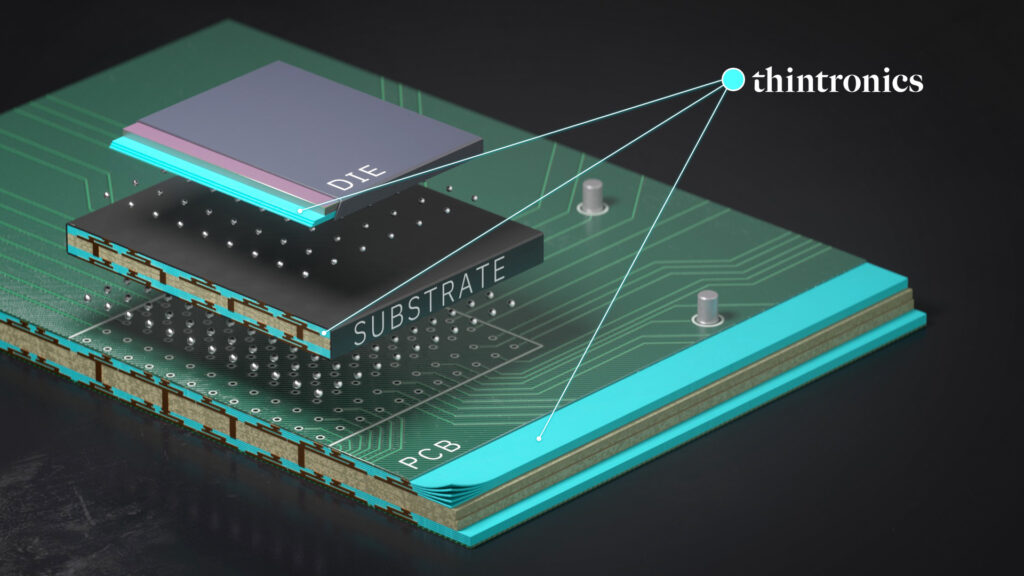
A representation of a unified insulator suite from Thintronics. (Graphic courtesy Thintronics Inc.)
Thintronics’ efforts to commercialize a novel insulator platform were boosted by a $23 million Series A financing round.
BERKELEY, Calif.—Electronic materials startup Thintronics Inc. was founded on the idea that conventional assumptions guiding the development of insulator materials limited the capacity of the industry to innovate. Since its founding in 2019, Thintronics has developed a suite of high-performance materials that display electrical and mechanical characteristics that “far outpace the state of the art,” the company said in a release.
According to Thintronics, the company is “reinventing interconnect insulator technologies to unlock next-generation computing, networking, and wireless performance.” Its novel materials are reported to enable wider bandwidths, increased power efficiency, and highly integrated form factors for advanced computing and communication systems.
Today, Thintronics provides high-performance insulators for emerging AI data center, networking, and RF/millimeter-wave (mmW) applications. The company recently raised a Series A funding round of $23 million, led by Maverick Capital and Translink Capital, that will support its efforts to commercialize a novel insulator platform.
According to Thintronics CEO Stefan Pastine, “the interconnect insulator is foundational to modern electronics.”
“However, it has yet to be optimized to operate near the theoretical limit of insulation,” he said in the release. “Additionally, the supply chain is fragmented across multiple electronic architectures. It is our vision to optimize the insulator and unify it across the fabric.”
Maverick Capital’s Kenny Safar explained Maverick’s confidence in Thintronics.
“To satisfy the explosive growth in demand for high performance compute, AI datacenters will need to incorporate faster data transfer speeds and wider bandwidth, while improving on power consumption and signal integrity,” he said in the release. “This is a formidable challenge that requires material redesign across all levels of the interconnect fabric, and we believe that Thintronics’ innovation in insulator film is a fundamental substrate-level enabler as AI servers adopt 224G standards and beyond.
“Additionally, Thintronics domestically sources all its components, and we believe this is a crucial step in onshoring advanced packaging technologies and ensuring that supply chains are vertically integrated in the U.S.”
Translink Capital’s Brendan Walsh also commented on the investment in Thintronics, saying he is “thrilled to support the Thintronics team in realizing their vision to deliver novel materials solutions which elegantly solve critical electrical performance bottlenecks for the AI data center and other high-performance applications.”
“As the industry grapples with the end of Moore’s Law, which has driven semiconductor scaling for decades, the increased adoption of multi-chip packaging and PCB-level solutions becomes paramount,” Walsh said in the release. “Thintronics’ holistic solutions across technology disciplines are precisely what is urgently needed to realize higher performance from the global supply chain.”
To satisfy this growing demand, Thintronics is entering the insulator market with technologies targeting chipsets, switches, and data center integrators for 224G links and beyond.
“The combination of superior electrical and thermo-mechanical performance allows our customers to unlock new design possibilities and new applications in networking, AI acceleration, RF mmW communication, and radar,” said Thintronics CTO Tristan El Bouayadi, in the release. “Additionally, by synthesizing ultra-thin dielectric layers, Thintronics enables form factor design optimization for consumer and infrastructure devices and products.”
